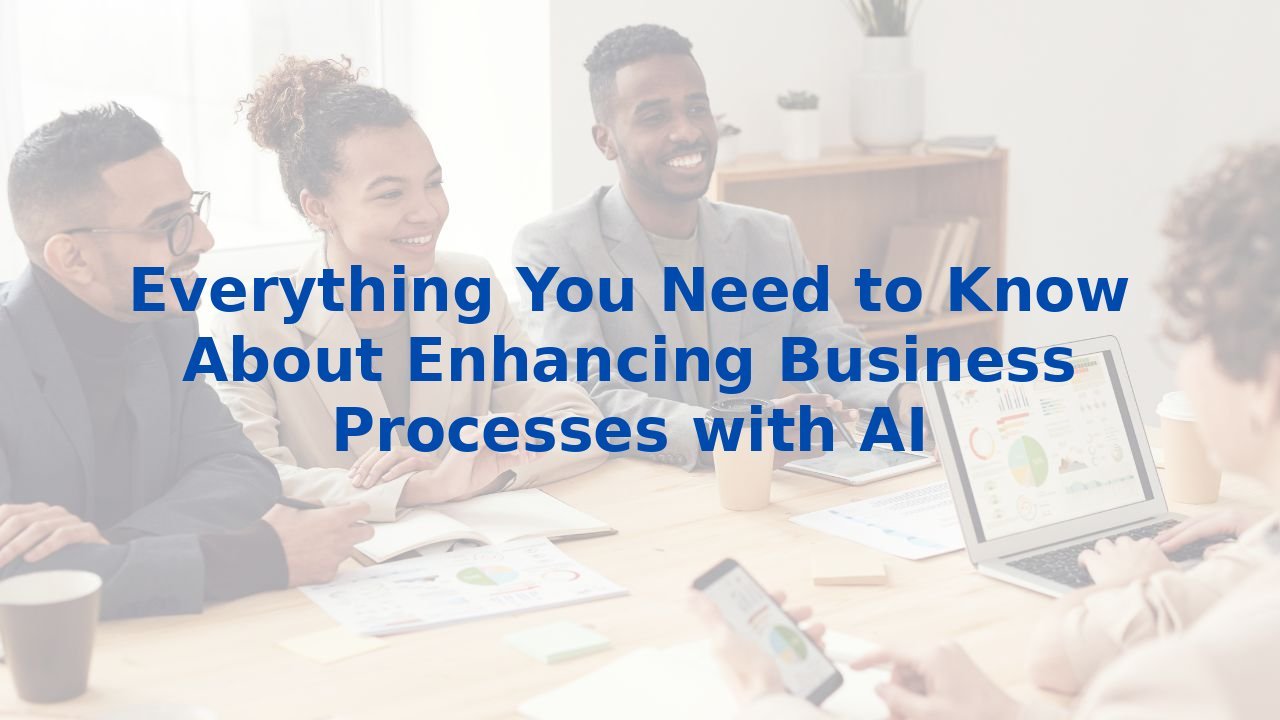Everything You Need To Know About Enhancing Business Processes with AI
Everything You Need To Know About Enhancing Business Processes with AI
In an age where agility and speed dictate success, businesses are on a constant quest for efficiency. The introduction of Artificial Intelligence (AI) has emerged as a beacon, guiding leaders towards enhanced operational workflows. This article explores how AI can revolutionize business processes and underlines the significance of empowering your workforce to adapt alongside this transformative technology.
What is AI Process Optimization?
At its core, AI process optimization is about harnessing advanced technologies—like machine learning, computer vision, and natural language processing (NLP)—to scrutinize and ameliorate existing business workflows. Organizations utilizing the power of AI can analyze past performance, uncover inefficiencies, and better anticipate customer needs, all while streamlining resource allocation for maximum impact.
How Does AI Optimize Business Processes?
Let’s explore the multifaceted role that AI plays in refining organizational efficiency:
“Efficiency is doing things right; effectiveness is doing the right things.” - Peter Drucker
1. Automating Simple, Repetitive Tasks
Automation is one of AI's most immediate impacts. By managing mundane tasks like data entry and invoice processing, professionals are liberated to focus on more strategic aspects of their roles, leading to amplified productivity.
2. Informing and Speeding Up Decision-Making
Utilizing historical data, AI provides decisive insights that enable quicker, more confident decision-making. Businesses that embrace data-driven strategies can pivot rapidly, remaining nimble in a rapidly changing marketplace.
3. Optimizing Resource Allocation
Understanding where to allocate finite resources is paramount. AI analyzes sales patterns and inventory levels, allowing organizations to make informed purchasing decisions, thus mitigating unnecessary expenditure and waste.
4. Speeding Up Planning and Research
NLP capabilities empower businesses to distill comprehensive reports into actionable summaries. This capability accelerates decision-making processes, particularly crucial in high-stakes business scenarios.
5. Mitigating Risks
Through predictive analytics, AI can signal potential risks before they escalate. Proactivity is key; organizations can preemptively address challenges, thereby conserving resources and maintaining momentum.
The Role of AI in Business Process Management
AI is not just an accessory; it’s embedded within every stage of Business Process Management (BPM).
1. Process Discovery
AI-driven process mining tools unearth existing workflows, pinpointing inefficiencies that may otherwise elude human scrutiny. Understanding these bottlenecks is integral to moving forward.
2. Process Mapping
AI-enabled data analytics can create visual representations of workflows. Businesses gain a clearer picture of interconnections, allowing for strategic improvements.
3. Process Automation
Organizations are capitalizing on AI bots to handle repetitive tasks, greatly expediting processes while minimizing human error. Automation translates to cost savings and faster turnaround times.
4. Process Management
By monitoring key performance indicators (KPIs) in real-time, AI keeps management informed about the health of operations, enabling instantaneous troubleshooting.
5. Process Improvement
AI not only identifies areas of inefficiency but also delivers actionable insights. The accumulation of historical data fosters sustainable enhancements that can flower over time.
Benefits of AI in Business Process Management
The repercussions of integrating AI are profound:
1. Improved Efficiency
Bye-bye to painstaking manual processes; AI takes charge, allowing employees to devote their energies to higher-order tasks that demand creativity and critical thinking.
2. Enhanced Decision-Making
In a world inundated with data, AI sorts through this noise to spotlight trends and predictive outcomes, ultimately refining decision-making and reducing errors.
3. Real-Time Monitoring
Immediate feedback is invaluable. AI tools keep businesses on track, allowing them to react promptly to emerging challenges and optimize operations on the fly.
4. Complex Decision Support
While human judgment is essential, AI complements it beautifully. By simulating various scenarios, businesses can visualize potential outcomes, making more informed strategic decisions.
Training Employees for AI
The potency of AI is undeniable, yet for its true capabilities to shine, your workforce must be equipped with the requisite knowledge and skills. Here’s why investing in employee training is crucial:
1. Understanding AI Capabilities
Training is key. Educated employees can utilize AI tools to their fullest extent, maximizing the technology’s benefits within your organizational context.
2. Data Analysis Skills
Employees skilled in data interpretation will thrive in an AI-enhanced environment. The better they understand the data, the more informed their decisions will be.
3. Automation and Integration
The successful roll-out of AI systems hinges on trained employees who can seamlessly weave new tools into the fabric of existing workflows.
4. Adaptability
As industries evolve, so must your workforce. Training cultivates a culture of adaptability, ensuring that employees can pivot with ease as new technologies emerge.
Conclusion
Artificial Intelligence stands poised to revolutionize the business landscape. From automation of mundane tasks to data-driven decision-making, the advantages are sweeping. As organizations embark on this journey, remember—your workforce is your greatest asset. By investing in their understanding of AI, you’re not just future-proofing your organization; you’re empowering your people to thrive in a dynamic environment. Embrace the change and lead with confidence because the future belongs to those who adapt.



